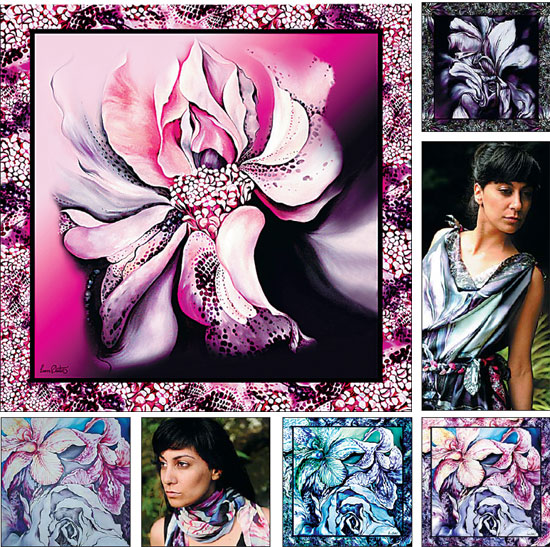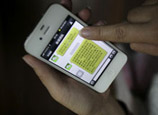
 |
| Leanne Claxton's works on fabric give fans an affordable collection. (Photos/China Daily) |
Some clothing designers are abandoning traditional silk-screen printing for more high-tech reproductions. Tiffany Tan tells us more about the trade-off between dyes and ink.
People who can't afford to hang Leanne Claxton's oil paintings on their walls can choose to wear her artwork for a fraction of the cost. Last year, the British artist began reproducing her 20,000-yuan ($3,206) paintings as silk scarves that can be worn as a headband, shawl or sarong.
But instead of screen printing the scarves, as is most commonly done, she chose to digitally print them to make better replicas.
"It's a fantastic way to interpret my artwork," Claxton, 29, says in a phone interview from Hong Kong, where she has been living since 2006.
"Because there are so many colors within the print, they're quite often difficult to achieve with screen printing. Digital printing is a great way to have hundreds of colors."
Imagine a huge ink-jet printer that uses cotton, silk or bamboo fabric rather than paper. Another digital method, more suited to polyesters, is to print the designs on paper, then heat-press them onto fabric.
In 2010, Claxton teamed up with Hong Kong fashion designer Johanna Ho to create digital print costumes for singer Eason Chan. This initial collaboration gave birth to the Ho-Claxton fashion line, which has already produced two collections and utilizes Claxton's digital fabric prints, as well as Ho's sustainable no-fabric-waste designs.
Digital prints began generating buzz on international runways at the end of the last decade, but designers have actually been working with them since the 1990s, experts say.
One of their biggest advocates is Mary Katrantzou, a London-based Greek designer "whose single-minded creativity shifted digital printing into high gear" in 2008, says Vogue magazine.
She was a classmate of Claxton's at Central Saint Martins College of Art and Design in London.
Meanwhile, brands like Prada, Alexander McQueen, Mulberry and Dolce & Gabbana also used digital prints in their collections.
 |














 Sex case leads to warnings about apps on smartphones
Sex case leads to warnings about apps on smartphones


![]()
